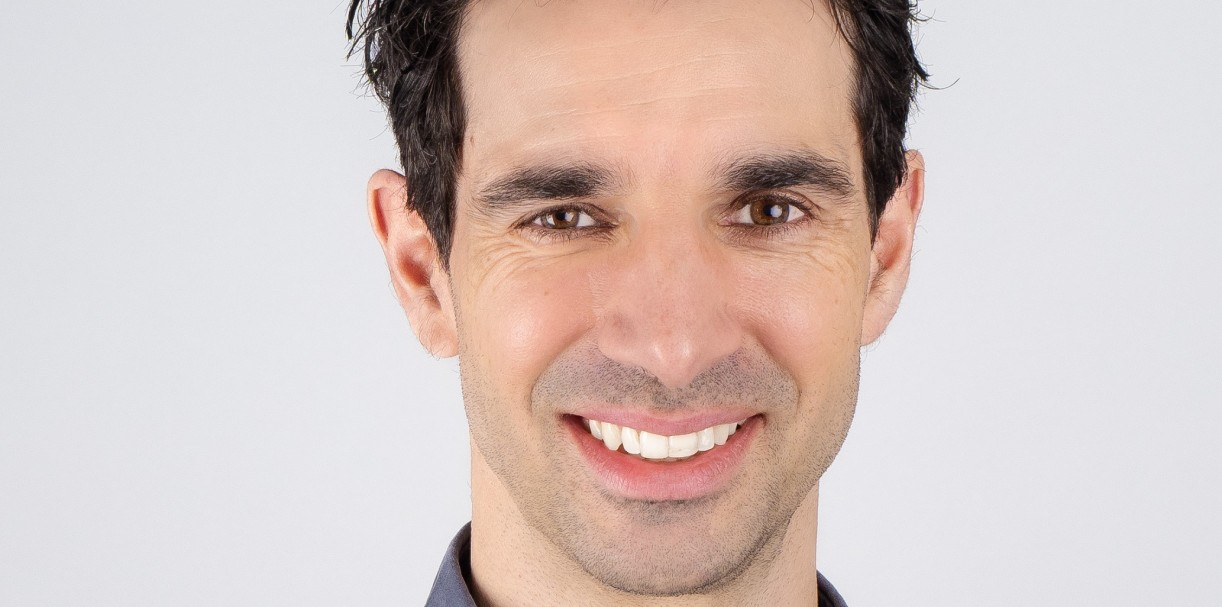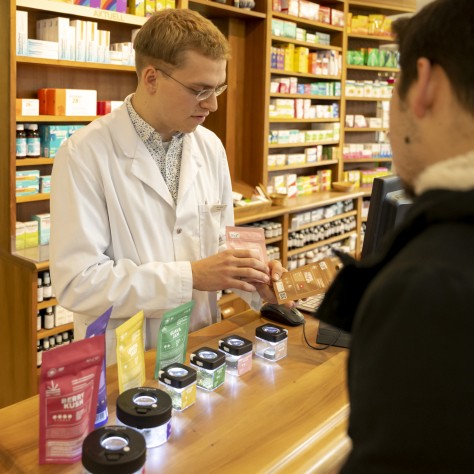
“The main health risk associated with occasional cannabis use is the tobacco smoke”
Dec. 2023Cannabis policy – what’s next?
Unlike tobacco, cannabis as such does not cause cancer. This is why Reto Auer’s main interest, as a general practitioner, is in getting people to stop smoking tobacco. His interest in getting them to limit their consumption of cannabis is only secondary, says Auer, who is leading the pilot study of controlled cannabis sales in Bern, Biel and Lucerne
Mr Auer, why are you carrying out a study of regulated sales of cannabis?
In Switzerland some 300,000 people consume cannabis. But because production and consumption are banned, no quality control is carried out on the products circulating on the illegal market. This means that cannabis users are exposed to a greater risk of coming into contact with harmful substances and dangerous synthetic cannabinoids. In our study we want to see whether a combined intervention – in other words, regulated sales combined with the availability of pharmacy-based advice on giving up smoking – can improve the health of cannabis users and public safety.
«Wir wollen mit unserer Studie prüfen, ob eine kombinierte Intervention – also der regulierte Verkauf mit einem gleichzeitigen Angebot für eine Rauchstoppberatung in den Apotheken – die Sicherheit und Gesundheit von Cannabiskonsumierenden verbessern kann.»
Und dann?
Dann hat uns das BAG untersagt, die Studie durchzuführen, weil der von der Studie vorgesehene Verkauf von nicht-medizinischem Cannabis inkompatibel war mit der damaligen Version des Betäubungsmittelgesetzes. Daraufhin haben das Parlament und der Bundesrat das Gesetz mit einem Experimentierartikel ergänzt, der schliesslich Mitte Mai 2021 in Kraft getreten ist. So haben wir dann einen neuen Anlauf genommen. Wir haben das Studienprotokoll angepasst, aber eigentlich ist die grundlegende Fragestellung gleich geblieben: Wie soll eine mögliche künftige Regulierung von Cannabis aussehen? Wir möchten mit den wissenschaftlichen Erkenntnissen aus der Studie einen Beitrag leisten zur Diskussion, wie eine verantwortungsvolle Cannabispolitik in der Schweiz gestaltet werden könnte.
Was verstehen Sie unter «verantwortungsvoller Cannabispolitik»?
Wir nehmen in unserer Studie die gleiche Haltung ein, wie sie auch die Eidgenössische Kommission für Fragen zu Sucht und Prävention nichtübertragbarer Krankheiten (EKSN) vertritt: Cannabis soll kontrolliert und legal zugänglich sein, aber der Konsum soll nicht gefördert werden. Konkret heisst das, dass wir in unserer Studie keine Werbung für die Cannabisprodukte zulassen. Und dass wir sie in einer neutralen Verpackung und zu einem relativ hohen Preis anbieten, obwohl die Apotheken, die bei uns in der Studie mitmachen, mit dem Erlös aus dem Verkauf nur den entstandenen Aufwand decken – aber damit keinen Gewinn erzielen.
Pharmacies seem to play an important role in your study.
Our study is based on a model involving pharmacies that is used in Uruguay. Moreover, the decision to sell cannabis in pharmacies is the result of a political consensus reached by the cities participating in the study. We also derive a number of advantages from working closely with pharmacies. Firstly, because pharmacists already have years of experience in handling narcotic substances, and secondly, because our study is investigating the impact not only of selling cannabis products but also of the counselling that is being offered. Our hypothesis is that if an individual knows more about what they are consuming, and if they feel less stigmatised and better understood in the process, they will be more willing to take up the offer of counselling. This study will be the first time that pharmacies will also be paid for providing advice on giving up smoking. In this respect we will be moving into uncharted territory, and it also marks a ground-breaking shift in thinking around collaboration in primary care. What pharmacies earn should not depend solely on how many medicines they sell but also on the services they provide.

Pharmacists have many years of experience in dealing with narcotics, and the study setting in pharmacies can also be used to examine the counsel- ling services offered.
Motiviert das die Apotheken, bei der Studie mitzumachen?
Ja, sicher, aber sie sind auch aus einem weiteren Grund an der Mitarbeit interessiert. Denn in unserer Studie bietet sich ihnen die Gelegenheit, sich als Grundversorger stärker als bisher mit der Hausärzteschaft und anderen Akteuren im Gesundheitswesen zu vernetzen: Wenn sie zum Beispiel merken, dass der Cannabiskonsum einer Studienteilnehmerin oder eines Studienteilnehmers ein problematisches Ausmass annimmt oder jemand eine Psychose entwickelt, können sie zu einem frühen Zeitpunkt das Gespräch mit der Person suchen und die betroffene Person gegebenenfalls auch gleich an die zuständigen Fachstellen verweisen.
What do you hope the advice on giving up smoking will achieve?
We know that roughly half of the people who consume cannabis in Switzerland also smoke cigarettes on a daily basis. And that about 80 per cent smoke tobacco mixed with cannabis. We’d like to see if people’s health improves if they stop smoking and instead eat cannabis or heat it in vaporisers or e-joints. The main health risk to which cannabis consumers are exposed comes from the tobacco they are smoking. That’s why my main interest, as a general practitioner, is in getting people to stop smoking tobacco. My interest in getting them to limit their consumption of cannabis is only secondary.
«Wir möchten prüfen, was es gesundheitlich bringt, wenn die Leute nicht mehr rauchen und stattdessen Cannabis essen oder es in Vaporizern oder E-Joints verdampfen.»
Because cannabis does less damage to health than tobacco?
Yes, because tobacco causes cancer anyway, even if it is not smoked but, for example, placed behind the lips in the form of a snus pouch. There are pretty good data for cannabis, on the other hand, showing that its use does not cause lung cancer. In addition, in the past 15 years there has been a great deal of research – mainly in the USA – into how dangerous cannabis actually is. The data show very clearly that individuals who consume only cannabis, and not tobacco, do not suffer the kidney damage or narrowing of the coronary arteries typically found in smokers. Cannabis consumers also do better in lung function tests. These major differences are probably also due to the fact that many cannabis users smoke maybe one or two joints per week, or in other words much less than the 10 to 20 cigarettes consumed by a typical smoker daily. This means that cannabis users are far less exposed to all the toxic substances contained in smoke. Nonetheless, the aim of the study is to encourage people not to smoke. Where tobacco is concerned, we know that it’s the smoke, and not the nicotine, that kills people. So it’s not unreasonable to assume that it’s the same with cannabis. This is something we’d also like to look at in the near future in a follow-up study.
In Ihrer Pilotstudie steht die Schadenminderung im Vordergrund.
Ja, aber nicht im Sinn, wie die Tabakindustrie das Wort verwendet. Natürlich haben Unternehmen wie Philip Morris Produkte entwickelt, die weniger schädlich sind als Zigaretten. Aber wenn sie diese neuen Produkte auch an Personen verkaufen, die vorhin nicht geraucht haben, betreiben sie keine Schadenminderung, sondern Profitmaximierung. Wir hingegen möchten, ausgehend von der Tatsache, dass viele Personen Cannabis konsumieren, wissen, wie wir als Gesellschaft sicherstellen können, dass sie das so risikoarm wie möglich tun, ohne dass wir die risikoärmeren Produkte an Neukunden verkaufen möchten.
So the point of your study is not to control the illegal market?
Our study is not designed to investigate the impact on the black market. This is because we are only enrolling about 1,000 people in the study and are leaving it up to the participants to decide whether they want to buy their cannabis from pharmacies or continue sourcing it on the black market. An additional aspect is that, compared with other drugs such as MDMA or heroin, it’s really easy to produce cannabis. Not for nothing is cannabis referred to as “weed” or “grass”: it grows anywhere.
Befürchten Sie, dass Ihre Studie einigen Personen den Weg in die Sucht weist?
Nein, denn um uns dagegen abzusichern, haben wir vorgeschrieben, dass alle, die sich für eine Studienteilnahme interessieren, eine Urinprobe abgeben müssen, um zu beweisen, dass sie schon vor Beginn der Studie Cannabis konsumiert haben. Wir wollen vermeiden, dass jemand aufgrund der Studie neu damit anfängt. Ausserdem ist mir wichtig, hier deutlich festzuhalten: Drogenkonsum ist noch lange keine Sucht. Und es ist auch nicht das Suchtmittel, das allein süchtig macht. Es wirken immer mehrere Faktoren zusammen, so spielen etwa die Lebensgeschichte und das erlernte Problemlöseverhalten einer Person bei der Entwicklung einer Sucht eine wichtige Rolle. Deshalb weist auch nur eine Minderheit – ungefähr 20 Prozent – aller Konsumierenden einen problematischen Konsum auf, sodass ihr Sozialleben und ihre Arbeit darunter leiden. Das gilt nicht nur für Cannabis, sondern auch für Alkohol oder Heroin.
What do you see as the advantages and disadvantages of regulating sales of cannabis?
The problems that are currently arising as a result of the ban and the black market can fundamentally only be tackled by regulating sales of cannabis. Seen from this perspective, the advantages of regulation are self-evident. This study will unfortunately not enable us to draw any conclusions about several of the possible disadvantages. There are concerns, for example, that regulation sends the wrong message to adolescents, possibly leading them to interpret the lifting of the ban as a sign that cannabis can’t be that dangerous. Another – and in my eyes warranted – concern derives from the fact that to date Switzerland has performed underwhelmingly in the regulation of tobacco and alcohol. Why should it be any different with cannabis – and can we as a society resist market forces? This is why we want to look at the impact of very strict regulation in our study. Will this offer be taken up by consumers? And how will it modify consumers’ behaviour?
«Grundsätzlich kann man die aktuellen Probleme, die durch das Verbot und den Schwarzmarkt entstehen, nur angehen, wenn man den Cannabisverkauf reguliert.»
Und zum Schluss: Wo ordnen Sie Ihre Pilotstudie in diesem Spannungsfeld ein?
Das Parlament und der Bundesrat haben das Betäubungsmittelgesetz angepasst, um Pilotversuche zum kontrollierten Verkauf von Cannabis zu ermöglichen. Ich verstehe das als Einladung an die Forschungsgemeinschaft, nun verschiedene Regulierungsansätze auszuarbeiten. Und diese dann – so unabhängig wie möglich – auch zu prüfen. Gleichzeitig hoffe ich, dass das im Umkehrschluss auch heisst, dass die Politik die Ergebnisse hilfreich finden wird – und bereit ist, sie im weiteren Gesetzgebungsprozess zu berücksichtigen.
Prof. Reto Auer
Reto Auer studied human medicine at the universities in Neuchâtel and Lausanne and at the Humboldt University of Berlin. Since 2016 he has worked as a general practitioner in a group practice in Bern and has headed the Substance Consumption section at the Institute of Primary Health Care in Bern (BIHAM). Working with researchers at the universities in Bern and Lucerne, Auer is the primary investigator in the SCRIPT (Safer Cannabis – Research In Pharmacies randomized controlled Trial) study.

_slider_small.png?lm=1702372067)


